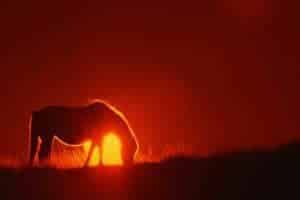
Caring for Horses Through Life and Death
Considering end-of-life decisions for your horse ahead of time will help minimize the unpleasantness inherent in these events and serve to provide optimal care for your horse.

Considering end-of-life decisions for your horse ahead of time will help minimize the unpleasantness inherent in these events and serve to provide optimal care for your horse.

Being moved from one place to another can be stressful for some horses, whether they travel by air or road.
Researchers examined horses’ physiological responses during transport while cross-tied or traveling loose.

Learn about the best ways to reduce stress when transporting horses by land or air.
Claudia Sonder, DVM, has been appointed director of the UC Davis Center for Equine Health, effective June 1.

Oleanders contain numerous toxic compounds which can be deadly to people and animals–including horses.

Learn about the equine heart and some conditions most often encountered by equine cardiologists.

Miniature Horses are more susceptible to some health problems than their larger counterparts.

The majority of horses with gastric ulcers do not show outward clinical signs.

Researchers will compare and analyze the entire genome of melanoma-bearing and melanoma-free ponies.
Finno received the award for her paper on electrophysiological studies in horses with neuroaxonal dystrophy.

Low body weight in horses can trace to many issues, including dental problems and chronic disease.

UC Davis researchers found that high-quality alfalfa hay is most effective for rehabilitating a starved horse.
Faculty members of the Center for Equine Health and the William R. Pritchard Veterinary Medical Teaching
The University of California, Davis, School of Veterinary Medicine has honored a couple interested in equine health with the 2011 El Blanco Award, which recognizes the significant contributions that animal owners and other benefactors have made to
Horse owners now have the opportunity to collect umbilical cord tissue immediately after a foal is born and save it as a future source of therapeutic stem cells through the Regenerative Medicine Laboratory at University of California, Davis
Stay on top of the most recent Horse Health news with
© 2022 Copyright Statement dolor sit amet, consetetur sadipscing User Terms, sed diam nonumy eirmod tempor invidunt ut labore et dolore magna aliquyam erat, sed diam voluptua. At vero eos et accusam et justo duo dolores et ea rebum. Stet clita kasd gubergren, no sea takimata sanctus est Lorem ipsum dolor sit amet.